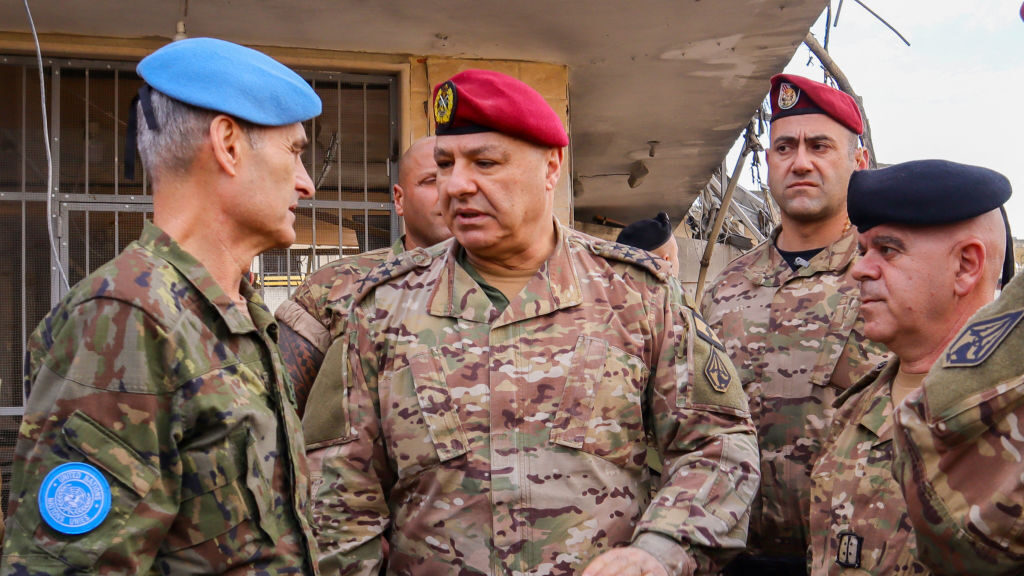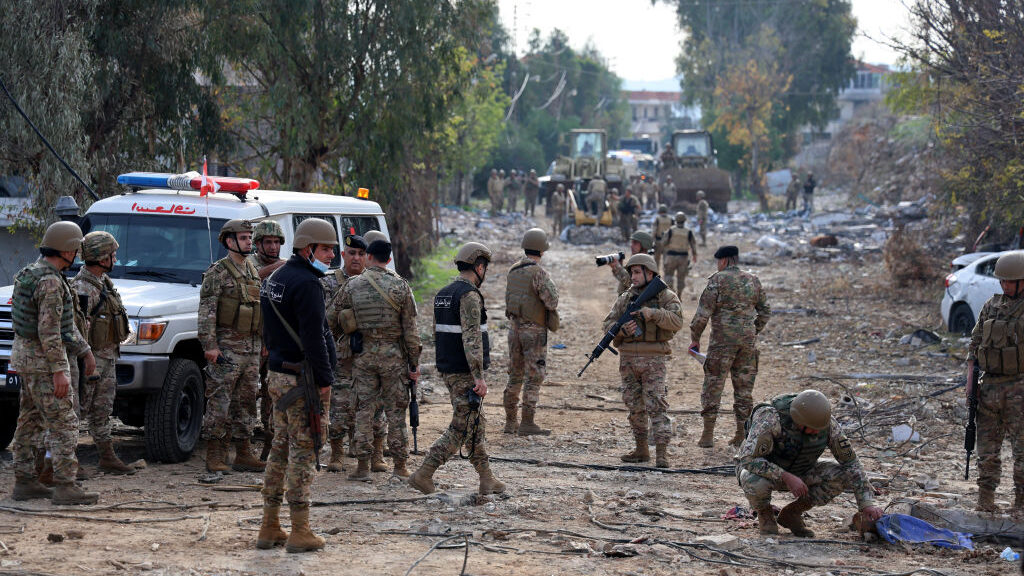- A key part of the ceasefire with Israel involves the LAF providing security in southern Lebanon as Israeli forces withdraw. Is it up to the task?
Already charged with a high-profile, critical mission in the tenuous ceasefire between Israel and Hezbollah, the Lebanese Armed Forces was thrust further into the spotlight today after its commander was elected president of the nation.
Joseph Aoun, who has run the LAF for eight years, came away with the victory after candidates from different Lebanese parties, including one backed by Hezbollah, dropped out and many pledged their support.
Before fireworks began exploding in Beirut following the election — a welcome change for many citizens who became accostumed to real Israeli airstrikes — retired LAF Gen. Wehbe Katicha told Breaking Defense that Aoun’s election will likely enhance the LAF’s profile at home and abroad, at a critical time for the force.
“The Lebanese army is the most trusted national entity by the international community, and as its commander reaches Baada [the presidential palace], I expect the LAF’s mission in the south to be facilitated and international military aid to be provided where they are needed most,” Katicha said.
Aoun’s victory comes 43 days into the 60-day ceasefire between Israel and the Iran-backed Lebanese group Hezbollah, which is mostly holding.

Lebanese army commander, General Joseph Aoun (C), speaks with Major General Aroldo Lazaro, Head of Mission and Force Commander of the United Nations Interim Force in Lebanon (UNIFIL) (L) during a visit to the southern Lebanese village of Khiam on December 23, 2024, after the withdrawal of Israeli forces from the area under a ceasefire deal with Hezbollah. (Photo by AFP) (Photo by -/AFP via Getty Images)
In his oath of office, Aoun pledged to “respect the ceasefire with Israel,” and said the government “will not compromise Lebanon’s independence and sovereignty, and it is time to place our bets on Lebanon, not on foreign powers.”
As Israel pulls back from Lebanese territory in the phased withdrawal plan, all eyes will be on the LAF and its obligation to ensure the areas it controls are safe for thousands of civilians who are attempting to rebuild after months of devastating combat. Experts who spoke to Breaking Defense were divided on whether the LAF has the necessary resources to be up to the task, but agreed that like its chief, the army is stepping into its most important mission in decades — and will need support at home and from abroad to pull it off.
The ‘Legitimate Security Provider’
On Monday Israeli Defense Forces (IDF), completed withdrawal from Naqoura, a major coastal city in Lebanon’s southwest, handing security operations there and in other smaller towns and villages south of the Litani River over to the LAF, including Bint Jbeil, Aalma El Chaeb, Tayr Harfa, Beit Lif and Shamaa.
“As part of the Mechanism-enabled transition, the LAF immediately deployed forces to the area to clear roads, remove unauthorized munitions, and provide security for the people of Lebanon,” the US embassy said in a statement on Tuesday.
A top US official involved the ceasefire efforts, Maj. Gen. Jasper Jeffers, said that the LAF is “the legitimate security provider for Lebanon and continues to demonstrate to me and the rest of the Mechanism it has the capability, intent, and leadership to secure and defend Lebanon. They have acted decisively, rapidly, and with clear expertise.”
When a ceasefire between Israel and Hezbollah was struck in late November, all parties were aware how tenuous it would be — that was one thing experts who spoke to Breaking Defense for this report agreed on.
Retired Lebanese Armed Forces Brig. Gen. Ziad Haykal was perhaps the most optimistic, saying, “The most likely expectation is that the ceasefire agreement will hold, especially since it is supported directly by the United States and several major powers on the one hand. On the other hand, it is also [in] Hezbollah’s interest for the ceasefire to hold amid all the destruction and displacement.”

The Lebanese army begins clearing roads and searching for mines and explosives in the area, on December 12, 2024 in Khiyam, Lebanon. (Photo by Ramiz Dallah/Anadolu via Getty Images)
A key aspect of the ceasefire is the implementation of UN Security Council Resolution 1701, which Haykal said calls for “no weapons” other than those belonging to the LAF present in the south. That, he said, was “one of the basic tasks that the army must carry out” and one that at least for now, Hezbollah “has expressed its full readiness to cooperate [with the LAF] in this regard.” (In his oath of office, Aoun specifically highlighted that the state alone should carry arms.)
Specifically, Aram Nerguizian of the Washington, DC-based Center for Strategic and International Studies, said that at an “operational level, there is an expectation for the LAF to redeploy forces to bolster existing troop strength in the SLS [South Litani Sector] (5th Brigade, 7th Brigade, 5th Intervention Regiment).”
He added this mission entails “allocating resources for troop housing/barracks, logistics and mobility capacity (critical to conducting additional patrols), and executing EOD [Exploding Ordnance Disposal] and other actions tied to Hezbollah weapons caches in the SLS.”
As such the acquiescence of both Hezbollah and its backer Iran have been key to the ceasefire holding, according to Middle East Institute Vice President for International Engagement Paul Salem.
“The implementation of the [ceasefire] agreement always had to be in the following way that Hezbollah and hence Iran would accept certain conditions, implement them, and the Lebanese army, with UNIFIL [United Nations Interim Force in Lebanon] would go in, fill the void, ensure that it’s being done, and build the military presence as Hezbollah withdrew,” he told Breaking Defense.
If all sides abide by the agreement, retired LAF Brig. Gen. Khalil Helou argued the LAF has plenty of manpower and firepower to do its limited mission.
“The LAF is in South Lebanon in order to restore the sovereignty of the Lebanese state south of the [Litani], [hence] no tanks, artillery and air force are needed,” he said. “Lebanese Armed Forces have enough man and material in order to deploy in all of South Lebanon. … So the Lebanese army is well equipped.”
But it’s unclear what would happen if Hezbollah attempts to reassert itself militarily or if Israel decides to reinvade, and Israel has made it known it is not completely satisfied with LAF’s efforts. Last week was accused of breaking the ceasefire by striking what it called Hezbollah targets in southern Lebanon. The IDF claimed the LAF had failed to neutralize rocket launchers there.
Elie Elias, the director of the Middle East Institute for Research and Strategic Studies, said that the LAF’s success is among several factors that are “far from guaranteed.”
The LAF’s “current capabilities fall short of effectively securing the southern borders. To fulfill this role, the LAF needs advanced surveillance systems, armored vehicles, air defense mechanisms, and better coordination tools to respond to border violations,” he told Breaking Defense. “Without these platforms and international support, its ability to protect the southern borders and all borders remains limited, particularly against threats from both Israel and non-state actors.”
Nerguizian agreed, arguing that the LAF is vastly under resourced for its current role regardless.
“At the level of raw logistics, the LAF’s current resourcing environment — which is subordinated to the constraints set by the Government of Lebanon and the national defense budget — have meant that the force has been able to secure less than 20 percent of its needs with the resources at its disposal,” he said.
International Support
While the LAF gets to work on the ground, Elias and Salem said support from the international community will be indispensable.
The LAF “potentially have the capacity [to implement the ceasefire], but certainly they need clear support, particularly financial and logistical from the international community, and the international community is well aware of that,” Salem said.
The Lebanese military has benefited from military aid for years, including Foreign Military Funds provided by from the United States, and continues to direct that aid to support LAF’s mission in South Lebanon.
The force got another shot in the arm this week after the State Department redirected $95 million in military aid from Egypt to Lebanon, a development first reported by Reuters and confirmed to Breaking Defense by a State Department official.
“These funds will directly support the Lebanese Armed Forces (LAF) as they work to implement the Lebanon-Israel Cessation of Hostilities,” the official said. “The LAF’s deployment into southern Lebanon – and Hizballah’s withdrawal – will represent the most significant steps towards implementation of UNSCR 1701 since the resolution was passed in 2006. Supporting the LAF to exert sovereignty across all of Lebanon will constrain the malign activities of Hizballah and their Iranian backers both in Lebanon and their destabilizing activities across the globe.”
Lebanon is also seeing vocal (and financial) support from France, which organized a conference in October that raised $1 billion for the country, $200 million of which was dedicated to the security forces.
It remains to be seen what impact Aoun’s victory in the presidential race will have on the LAF’s mission in the south, but it could have a more direct impact on international support. He was reportedly the preferred candidate of two nations with historically deep pockets: the US and Saudi Arabia.
@Breaking Defense





